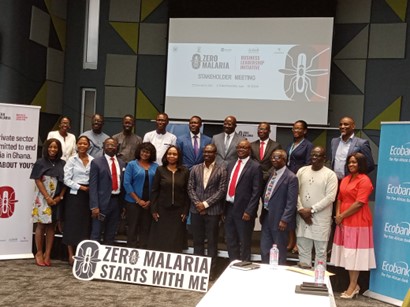Ecobank Ghana and partner organisations implementing the Zero Malaria Business Leadership Initiative (ZMBLI) have called on the private sector to join forces in contributing toward efforts to eradicate malaria.
The ZMBLI, which was launched in June 2023, received a seed capital of US$120,000 from Ecobank; but considering the huge financing gap between resources required and the annual funding allocations to fight against malaria, there is a need for the private sector to come onboard to mobilise more resources, the project’s partners said.
The ZMBLI initiative aims to stimulate private-sector engagement in the fight against malaria, and is being led by the Ecobank Group in partnership with the National Malaria Elimination Programme (NMEP), Speak Up Africa and Ministry of Health.
Acting Managing Director-Ecobank Ghana, Joana Mensah, stressed that with malaria on record as the leading cause of morbidity and mortality, investment in implementation costs for interventions to push Ghana into elimination is crucial; hence the need for other corporate institutions to support the malaria fight.
“We recognise the importance of corporate Ghana contributing its quota to needs of the country. We feel it’s important that we contribute our quota in giving the US$120,000; but that was consumed by three items- microphones, tablets and pick-up trucks. So, it is important to also mobilise and get other corporate bodies to contribute in the fight to ensure that as a country we can eliminate malaria,” she said.
Private Sector Coordinator-National Malaria Elimination Programme (NMEP), Phyllis Owusu-Achau highlighted that malaria accounts for about 30 percent of all outpatient department (OPD) visits, and 25 percent of all hospital admissions in Ghana.
Furthermore, the cost of treatment and care is between US$10.20 – US$46.62 per case; and the cost to business is US$6.6million, affecting all businesses as eight to nine workdays are lost by patients.
She emphasised that eliminating malaria by 2028, in line with the national agenda, is a feasible and worthwhile goal. The benefits of this, she said, include preventing 86 million clinical malaria cases; 4,468 deaths; and economically saving about US$32billion annually.
Head-Marketing and Corporate Communication, Ecobank Ghana, Dr. Daniel Kasser Tee, mentioned that based on an analysis of the malaria burden and funding gap, a steering committee to mobilise private sector funds in support of the project has been established.
The campaign intends to leverage Ecobank’s network in the sub-region to mobilise private resources and increase funding for national malaria elimination in a sustainable way.
He revealed that Ghana became the fifth country to join the ZMBLI project after it was first launched in Senegal, Benin, Burkina Faso and Uganda, hence a lot of best practice ideas were picked from those countries to help better fine-tune the country’s intervention initiatives.
Malaria prevalence in the year 2011 stood at 27.8 percent but was reduced to eight percent in 2022, based on control interventions such as the provision of insecticide nets, indoor spraying, larval source management, malaria vaccines, seasonal malaria chemoprevention and case management diagnoses.
AngloGold Ashanti, which is a corporate entity involved in the fight against malaria since 2015, shared that it invests about US$605,000 annually in malaria prevention initiatives, and will gladly join the ZMBLI project to deepen impact.
Corporate organisations willing to support the fight against malaria are encouraged to visit Ecobank digital platforms or visit any branch of the bank for assistance.










